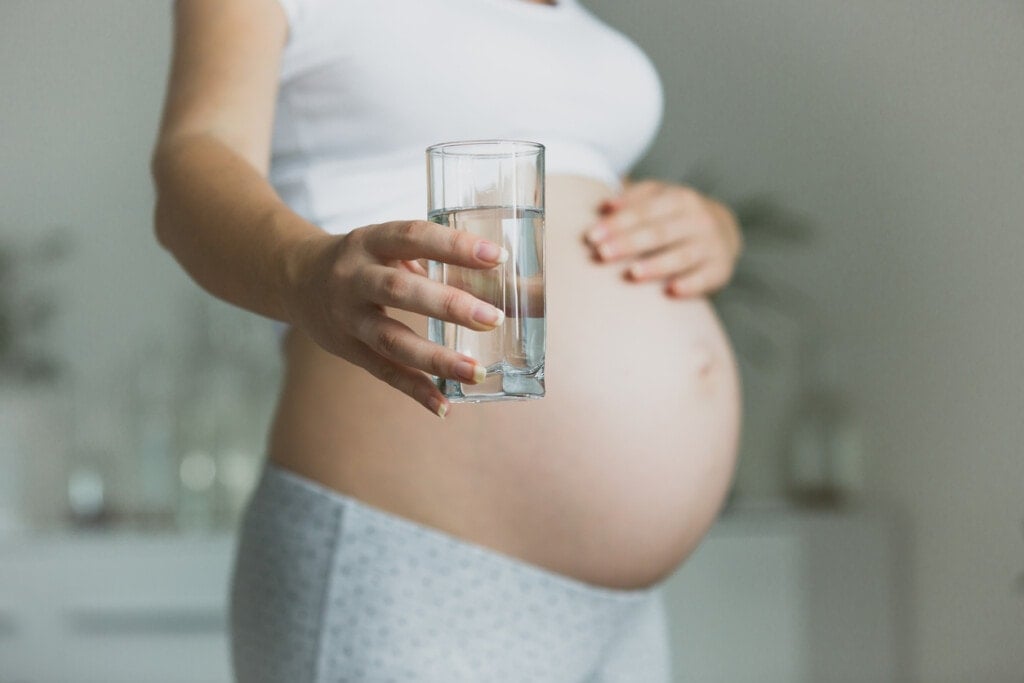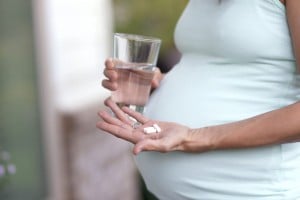You’re pregnant; congratulations are in order! But instead of toasting with champagne, you’ll be reaching for a refreshing glass of water, as hydration is a huge part of doing everything you can to create a healthy environment for your little one. Drinking enough water during pregnancy is super important for all things going on inside your body and your baby’s well-being. But you should be aware of the potential dangers of tap water and pregnancy.1
Water ensures nutrients reach the placenta, regulates your body temperature, and even prevents those pesky pregnancy discomforts like feeling bloated or constipation. So, as you try to gulp down that extra H20, knowing whether your tap water is safe during pregnancy is crucial.1
Tap Water Dangers in Flint, Michigan
While tap water in many countries goes through rigorous testing and treatment processes, there is still a possibility of contaminants present in the water supply. The devastating impacts of the Flint, Michigan, water crisis serve as a reminder that a safe drinking water supply is critical. In 2014, officials switched its water source from the Detroit water system to the Flint River to save money, with severely negative consequences for its residents.2
Flint River water was highly corrosive, causing lead to leach from aging pipes and fixtures into the drinking water supply. Two years later, Flint residents were advised not to drink municipal tap water unless it was filtered to remove lead. Lead is a potent toxin that severely affects brain development, especially in young children and fetuses. As a result, thousands of residents, including pregnant women and their unborn babies, were exposed to dangerously high lead levels. The contamination crisis brought to light the issue of inadequate water treatment and monitoring, as well as the detrimental impact it can have on public health.2,3,4
Possible Tap Water Contaminants
The incident in Flint is an extreme and rare example of water quality neglect in the United States. However, it highlights the need for continuous monitoring, regular testing, and effective treatment measures to prevent similar situations from occurring. Some common tap water contaminants you should be aware of include bacteria, viruses, heavy metals, pesticides, and even traces of pharmaceuticals. Contaminants generally fall into these four categories, according to the Environmental Protection Agency:5
- Physical: These contaminants impact water’s physical appearance or properties, like sediment or organic material.
- Chemical: These are elements or compounds that may be naturally occurring or made by humans, like nitrogen, bleach, pesticides, metals, and drugs.
- Biological: These contaminants or microbes like bacteria, viruses, and parasites.
- Radiological: These chemical elements emit radiation, like plutonium and uranium.
You can take several steps to ensure the safety of your tap water. Start by contacting your local water provider to inquire about the water quality in your area. They should be able to provide you with a water quality report that outlines the specific contaminants found and their levels. Not sure who to call? Start by using this helpful resource from the Environmental Protection Agency (EPA) here. Additionally, if it provides peace of mind, consider having your tap water tested by an independent laboratory or local health department for a comprehensive and thorough analysis.6
How Can Tap Water Contaminants Affect You?
Common tap water contaminants have various effects on the human body, for example:
- Bacteria and viruses, such as E. coli and cryptosporidium, can cause gastrointestinal illnesses that may have more severe consequences during pregnancy.7,8
- Heavy metals like lead and mercury can also pose risks to the fetus’s developing nervous system.9
- Pesticides and herbicides, commonly used in agriculture, may find their way into water sources and have been linked to developmental issues.10
By being aware of these contaminants, you can take appropriate measures to safeguard your and your baby’s health if you drink tap water during pregnancy. One effective tap water safety tip is to use water filters. Various types of filters are available, each designed to target specific contaminants. For example, activated carbon filters can remove chlorine, some pesticides, and organic compounds. Reverse osmosis systems effectively eliminate heavy metals, bacteria, and viruses. Selecting a filter that addresses the specific contaminants of concern in your area is essential. Be sure to follow the manufacturer’s instructions for installing, maintaining, and replacing filter cartridges to ensure your water stays safe.11,12
Other Ways To Decrease Tap Water Contamination Risk
Apart from using water filters, there are additional steps you can take to minimize the risks associated with tap water. Heading out of town for several months or splitting your time between two different properties during your pregnancy? Avoid leaving water standing in old pipes for extended periods, as this can increase the likelihood of contaminants leaching into the water.13
Another best practice for water safety is to run the tap for a few seconds before using water for drinking, cooking, or showering, as this can flush out any stagnant water. If you have not used a faucet or showerhead in your home recently (for example, a week or more), the CDC recommends flushing the faucet or showerhead before using it for the first time. Turn on the cold water fully and adjust it to avoid overflowing or splashing. Let the cold water run for 2 minutes, then turn on the hot water fully.13
While there are concerns about tap water and pregnancy, remember that the risks associated with contaminated water are generally low because of federal laws. Bottled water is always a safe bet if you’re traveling abroad or to an unfamiliar location. By contacting your local water provider, understanding common tap water contaminants, and utilizing water filters, you can confidently sip away, knowing you’re providing the best for your little one. Remember, every drop of water you drink is a small act of love and care. Cheers to staying hydrated and making informed choices for a healthy and happy pregnancy journey!14









